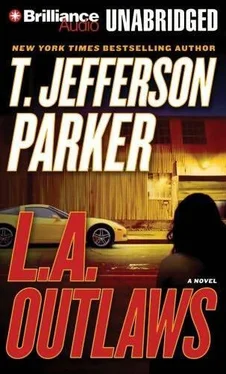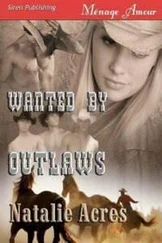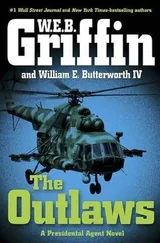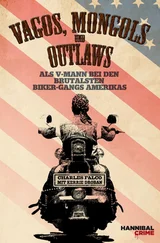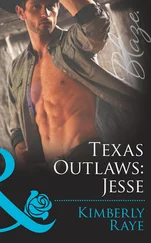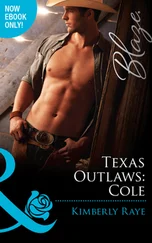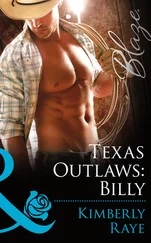BOYER: “Mark Tice of UCLA School of Law, you said that Lupercio Maygar was suspected of sixteen murders right here in Southern California. Is what happened to him justice?”
TICE: “Of course not. There’s no process. It’s the worst kind of vigilante action.”
STEINER: “Which is interesting, because ninety percent of the letters and calls we get about Allison are positive. People like her.”
WELLS: “That’s why we have a rich history of outlaw lore in this country. People crave stories. People crave heroes. And villains. Remember the old saying, When the facts become legend, print the legend. ”
BOYER: “Interesting. The teacher that Allison mentioned, Suzanne Jones, was nearly a victim of Lupercio Maygar. She had apparently witnessed a crime that he committed. Now she’s free to come out of hiding and return to her family and to work. Any thoughts on that?”
WELLS: “Allison is co-opting Suzanne just like she co-opted Joaquin. She’s justifying herself.”
STEINER: “Sure. Good deeds make good legends.”
BOYER: “When someone finally lifts that mask from Allison Murrieta’s face, who are we going to see? If she isn’t Joaquin Murrieta’s great-great-great-great-great-great-granddaughter, who is she?”
TICE: “I won’t speculate, Dave.”
WELLS: “An out-of-work actress.”
STEINER: “An employee of one of the franchises she loves to stick up.”
BOYER: “Quickly, now-guess her age.”
STEINER: “Late twenties.”
WELLS: “Mid-thirties.”
TICE: “Old enough to stand trial as an adult.”
BOYER: “Wig or no wig?”
WELLS: “I think wig because-”
STEINER: “It’s her hair.”
TICE: “It looks real to me.”
BOYER: “We’re out of time. Thank you all. I see the phones are really ringing now. Call back later, folks, we’ll be taking calls on our ten o’clock hour. We want to know what you think. Thanks to our guests.”
Hood finished off the cold burrito and Marlon called.
“Where’s Jones?”
“I don’t know where she is, sir. I haven’t talked to her in two days.”
“Do you have a number for her?”
“Not a current one, no.”
“I want to bring her in, ask her some questions about Allison Murrieta. This whole thing has gotten out of hand. You’ll help with that?”
“Of course I’ll help.”
“I’ll take some uniforms and collect her myself. I can keep you out of it.”
“No, sir. It was my idea that she’s Murrieta. I’ll face up to that.”
“Make it happen.”
“I’ll do my best.”
Forty minutes later the phone rang again.
“Hello, Charles Robert.”
“You okay?”
“I’m perfect. Merle’s at the House of Blues. I got tickets at will call.”
“Pick you up or meet you there?”
“I’m outside your apartment in a rented Cadillac STS. It’s black on black and the leather’s smooth as your cheeks after a shave, Charlie. I kid you not.”
It took Hood a moment to figure how she’d gotten his home address. He looked out the window and saw the car. “You looked in my wallet at the restaurant.”
“I confess.”
“You saw the news?”
“Did I ever. I’ve been with my boys almost two whole days. Right now I’m the happiest woman on earth. I’m celebrating and I’m going to listen to Merle and drink. I rented the car, bought a new blue blouse and some tight black jeans for you. Tomorrow we’re all moving back home and things are getting back to normal. Except Ernest and I will have separate quarters from now on. He’s cool with that. I start school Monday. Can you hurry?”
“I need five minutes. Come on up.”
“We’d never get to the House of Blues.”
Five minutes later Hood came down. Before getting into the STS, he went to the driver’s-side window and gave her his best traitor’s kiss.
Merle Haggard looked seventy years old and too mean to die, which Hood figured was pretty much what Merle was. His voice was clear and honest, and his band played the sad old songs with the same lightness and good cheer that Hood had always loved.
Suzanne was beautiful, though Hood missed her brown waves. The new blouse was silk, sleeveless, cobalt blue. She wore a beat-up denim jacket over it and it looked right. She drank four whiskey sours fast then went to seltzer with lime. She kept the beat with a boot toe on the floor and a hand high on Hood’s thigh under the table.
She leaned back and caught his eye, smiling big and innocent, and Hood marveled at all she had accomplished in the last days, in the last months, in her short life.
Hood listened to Merle’s stories of heartbreak and drinking and poverty and prison, and he thought of being young in Bakersfield and how those songs had nudged him toward the right side of the law. The loneliness in them had hit him hardest-the aloneness of the drinker who calls the bar his home, or the con walking to his execution, or the released inmate who can’t get away from his past. Now Hood realized that the songs were also about Suzanne Jones and Allison Murrieta and all people who chase their own histories to the edge of their own cliffs. He saw that stories like these get told over and over because they apply to so many of us, only the names of the characters changing with time.
“You look thoughtful, Charlie.”
“Every once in a while one sneaks in.”
She held his gaze. “I thought about what you said the other morning when I was up in the tree. About us meeting when we were real young, both getting our pictures taken for the newspaper. When you said it I thought it was an unglamorous proposition but I came to like it. Very down-home. Two kids, they fall in love and ride off together. Exactly not what Merle sings about.”
“I never thought glamorously. It’s a fault.”
“Don’t act so humble, Charlie. You’re not that great. Indira Gandhi said that but I can’t remember about whom.”
Hood smiled back but felt a strong sorrow.
A little past midnight he and Suzanne came through the exit. The night was damp and warm, and Marlon and two deputies were waiting.
They worked it out so Hood would drive her in the STS to the Marina del Rey safe house. The safe house was Hood’s idea-a courtesy to Suzanne, who would be recognized by Sheriff’s deputies and reporters if they talked at headquarters. This was not an arrest. It was not an interview, not an interrogation.
Susan stared straight ahead and said nothing.
“They want to ask you about Allison,” said Hood.
She continued staring through the windshield.
Hood followed Marlon’s plainwrap for the freeway. The Sheriff’s cruiser had fallen in behind him.
“I know you’re her,” he said. “I know you’ll hate me for what I’ve done, but I didn’t betray you to gain something for myself. I did it because Allison is going to get you killed. I love you and I’m sorry.”
“You love me? What does that matter? You just accused me of murder and armed robbery. I want my lawyer.”
“You’re not under arrest.”
She was on her phone before Hood made the freeway. She turned to the window and spoke quietly, hung up, then resumed her wordless surveillance through the windshield. Five minutes later Hood heard a ringtone-the whinny of a horse-and Suzanne again turned away from him.
Hood caught a few phrases:
“L.A. Sheriff ’s…”
“… asinine thing I’ve ever…”
“Allison Murrieta, the…”
“… hilarious someday…”
“… right now, a safe house in Marina del Rey, on Bora Bora…”
She punched off with a flourish and flung the phone back into her bag.
Читать дальше
